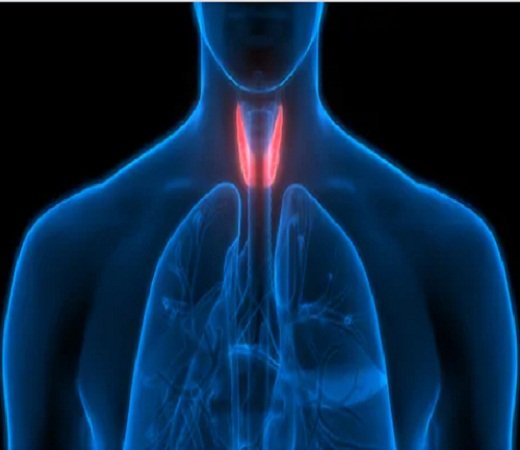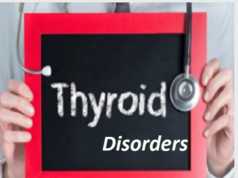Every part of a human body has a major role to play. Just a slight change in the functions of a particular organ, tissue or gland, the body system will react to this and try to adjust the changes to attain its usual balance. However, there is a case in which a balance can’t be achieved unless there is an eternal medical intervention. This is exactly the case with hypothyroidism, a thyroid disorder that affects the thyroid gland and reduces its ability to produce the adequate hormones needed by the body. In other words, it is a term used to describe the under activeness of the thyroid gland. In this article we are going to discuss about Hypothyroidism , Causes of hypothyroidism , symptoms & Its treatment.
Being a hormone-producing gland, the thyroid produces thyroxine which generally helps to regulate the metabolism of the body. The moment the thyroxine level in the body becomes low, the rate at which the body functions reduces as well. This is a clear indication that thyroxine imbalance is very important and that it shouldn’t be taken for granted.
According to a health survey carried out in the United States, about 4.8% of the total population of the country above the age of 12 are suffering from hypothyroidism. This shows that this disorder is a part of us already.
The Basic Facts About Hypothyroidism.
Biologically, the thyroid gland which houses the hormone thyroxine is located around the front part of the neck, right below the larynx and it has two lobes attached to its side at both ends. Before any secretion can be made, there have to be the actions of thyroid-stimulating hormone (TSH) in place. This particular hormone controls the secretion of thyroxine.
To help broaden your knowledge about hypothyroidism, right here we will be sharing all you need to know about the causes of the disorder, the hypothyroidism symptoms checklist that you are most likely going to notice, and the best available treatment measures.
The Symptoms Hypothyroidism:
Being that the hormone produced by the thyroid gland has numerous effects on the functions of the organs in the body and the body System at large, a reduction in the level of thyroxine produced brings about several negative effects. The most obvious symptoms of hyperthyroidism include;
- fatigue, weight gain, cold intolerance
- Reduction in heart rate, speech, and general body movement
- Body weakness, cramps, and joint and muscular pains
- Constipation, heavy periods, high level of body cholesterol, Amenia, and insomnia
- Decreased sweating, needles, and pins, loss of libido, puffy feet, hands, and face
- Recurrent respiratory and urinary tract infections
- Loss of body coordination, dry skin, and depression.
If any of these symptoms are ignored at the early stage, it could further result in more complicated symptoms such as hoarseness, hearing loss, slow heart rate, and missing eyebrows. In more severe cases, the patient might experience poor mental development, delayed puberty, poor growth, and poor development of teeth.
However, hypothyroidism develops slowly. This simply means that a patient might be suffering from hypothyroidism without even knowing until it becomes severe. And being a disorder diagnosed majorly through a blood test, it is quite difficult to figure out the fact without proper diagnosis.
Treatment of hypothyroidism:
When it comes to treating hypothyroidism, the best and most effective way to go about this is through the use of thyroxine supplements and some hypothyroidism medication. These synthetic hormones help to reduce the negative effects the lack of it has caused on the body by balancing the level of the hormones needed in the body. Although, there is no medically proven cure for hypothyroidism. It can only be controlled, but not cured.
Synthetic thyroxine:
This particular treatment measure helps to replenish the deficit hormone needed by the home. Synthetic thyroxine usually takes the form of the T4 hormone. Often, doctors do recommend after taking a hypothyroidism test that this synthetic thyroxine should be taking in the morning before any meal.
The dose of the synthetic thyroxine to be taken is determined by the medical history of the patient in question prior to hypothyroidism diagnosis, the symptom, and the current level of TSH in the body system. After this has been determined and the dose administered, doctors also go-ahead to monitor the blood if the administered synthetic TSH needs to be adjusted. However, this monitoring decreases over time when the body system begins to balance up.
Iodine and nutrition:
Another treatment measure to consider when trying to treat hypothyroidism is diet and the control of the intake of iodine. Iodine deficiency has been one of the major causes of goiter development and the abnormal enlargement of the thyroid gland. If not maintained and kept under control, excessive intake of iodine will worsen hypothyroidism.
This is why affected patients need to keep a close tab on their everyday diet. A slight change in the hypothyroidism diet could cause either an increase or decrease in the level of the hormones in the body system
Natural remedies of Hypothyroidism:
This involves the use of some naturally occurring treatment measures to take care of the effects of hypothyroidism. These include;
- Selenium: The use of selenium is one of the most basic treatment measures available for taking care of hypothyroidism. However, this can’t be used without being administered by a physician. Excess of this could result in more adverse health conditions.
- Vitamin D: The deficiency of vitamin D in the body system has been linked to Hashimoto, a disease which is known to be one of the major cause of hypothyroidism. This simply means that by taking vitamin has a supplement medicine, there are high possibilities that it will help treat hypothyroidism indirectly.
The Possible Causes Of Hypothyroidism:
- Hashimoto’s disease:
This is an autoimmune disease in which the immune system attacks its body cells and organs. Most importantly, the thyroid gland where it causes inflammations. At this point, the effects of the inflammation reduce the ability of the gland to produce the thyroxine hormone.
- Thyroiditis:
This is an inflammatory disorder in which the hormones in the thyroid gland leaks into the bloodstream and then leads to hypothyroidism. After a month or two, this develops into hypothyroidism. This disorder could be as a result of pregnancy, bacterial infections, or an autoimmune condition.







